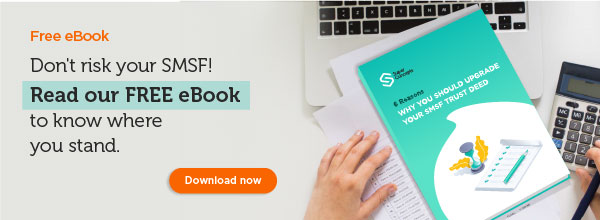
Executive Manager, SMSF Technical Support

The SuperConcepts Technical Services team recently attended the Self-Managed Super Fund Association (SMSFA) National Conference in Adelaide. The SMSFA National Conference is the highlight on the SMSF industry calendar, and it is attended by administrators (like SuperConcepts), Software providers, Auditors, and the Australian Taxation Office (ATO), among many other industry groups.
One of the key sessions was a presentation that looked at the vexing issue of where a member has requested a benefit payment but dies before the benefit is paid.
Assuming the payment is still made, the question then becomes; is it still a member benefit, or is it now a death benefit?
Why does this matter? Well, the recipient and tax treatment of each can be markedly different. If it is a death benefit, then the fund trustees might follow any binding death benefit or reversionary pension nomination or, in the absence of either, use their discretion as to whom the benefit is paid.
However, if it is a member benefit, the benefit must be paid to the deceased’s estate. Member benefits can be received tax-free if the member is 60 years of age or over. Death benefits, however, may be taxable if the beneficiary is an independent adult child.
Let’s take Luke. He’s 67 years of age and has been married to Nancy, aged 66, for 42 years. He is drawing an income stream in the form of an account-based pension worth $900,000 from a large superannuation fund. It consists of the following components:
Tax Free $270,000
Taxable $630,000
Luke and Nancy have 3 independent adult children, Dwayne, Shane and Barry. Luke has a binding death benefit nomination (BDBN) that states that he would like Nancy to receive his benefit in the fund when he dies. As Nancy is Luke’s spouse, she will receive any death benefit lump sum payment tax-free. If she decides to commence a death benefit pension, any income she receives from the pension will be tax-free.
As Nancy is provided for due to Nancy receiving his super benefit due to the BDBN, Luke’s Will states his estate is to be split evenly between his 3 adult children. His estate is not worth a great deal, as Luke and Nancy have put most of their money into super. Luke and Nancy are executors of each other’s estate.
As the legislation will change on 1 July 2022, allowing those under 75 to make contributions without meeting the work test, Luke and Nancy decide to take all his benefits out of the fund as a cash lump sum. They will then re-contribute the money back into the same super fund as non-concessional contributions over several years, using the increased contribution flexibility, splitting the contributions and effectively turning the taxable component ($630,000) into a tax-free component. Luke lodges a withdrawal request with the large superannuation fund. The fund trustees acknowledge receipt of the benefit and inform Luke that the fund will pay $900,000 cash into his nominated personal account.
Unfortunately, Luke dies suddenly before the money has been received. Nancy informs the large superannuation fund of Luke’s passing and that she wants to retain the death benefit in the fund; however, they consider the amount to still be a member benefit and pay it into Luke’s personal account. This means the superannuation proceeds are no longer driven via the BDBN but now form part of Luke’s estate. As executor, Nancy has a fiduciary duty to maximise the monies of the estate. Therefore the 3 adult children receive the $900,000. This is a less than satisfactory outcome for Nancy and not what Luke had envisaged.
If the payment had been considered a death benefit, the trustees would be bound to follow Luke’s directions in the BDBN and pay the benefit to Nancy. Nancy could choose to take a lump-sum death benefit, death benefit pension or a combination of both. Assuming she opts for a pension, the benefit is retained in the superannuation system and continues to be concessionally taxed. It also means Nancy continues to receive an income stream from the fund.
What is the ATO’s position on such an outcome? The ATO has released Private Binding Rulings, which are rulings provided to private individuals on the matter. Historically the ATO has oscillated between considering the benefit a member benefit and a death benefit but now has a settled position on this – it is a member benefit. Which in some ways makes sense, as a large superannuation fund may not know the member has died since requesting a member benefit payment.
But what about an SMSF? It would be difficult for the trustee to claim they were unaware of a member’s death (given the nexus between trustees and members). If the trustees of an SMSF paid out a member benefit, knowing full well the member has died, cutting out a beneficiary under a BDBN and paying the member benefit to the deceased’s estate – this scenario could very well lead to litigious action.
Will the ATO’s position hold? Whilst the publicly released details of PBRs are scant on the facts of individual determinations (and thus, we do not know all the nuances of each decision), it is worth remembering that ATO does not make the law. We will not know until there is a court case on this, when, say, a beneficiary under a BDBN tests it in a court of law as to whether the ATO’s logic holds in situations involving SMSFs.
Subscribe now and follow us on LinkedIn, Facebook, and Twitter

This eBook, written by one of Australia's most trusted SMSF experts, Graeme Colley, uncovers 6 reasons why you should update your trust deed.
To learn more about how our range of SMSF services phone us on 1300 023 170 or request a call back.
Alternatively click through to view our range of services for trustees, accountants and advisers.